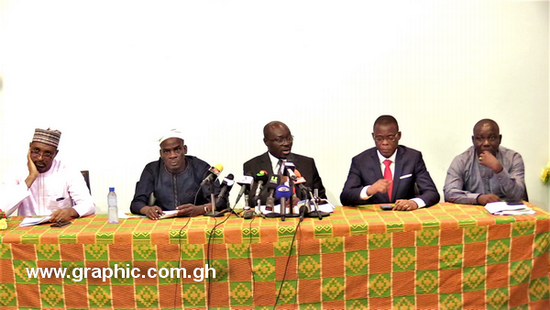
Wrong policy choices cause of cedi depreciation — Minority
The Minority in Parliament has attributed the depreciation of the cedi to the gross mismanagement of the economy and wrong policy choices by the government.
It said the sharp cedi depreciation had worsened the country's economy, which resulted in the collapse of companies, loss of jobs and decreasing investor confidence.
State of economy
At a media encounter on the state of Ghana's economy in Accra yesterday, the Minority Spokesperson on Finance and Ranking Member on the Finance Committee of Parliament, Mr Cassiel Ato Forson, said: "Things are falling apart and the expected Gross Domestic Product (GDP) growth rate of 8.8 per cent cannot be achieved."
He said the worsening depreciation of the cedi with its attendant disruption of macro and micro economic performance had affected the credibility of the budget statement and economic policy of government for the 2019 financial year.
Review micro, macro economic targets
Mr Forson, therefore, asked President Nana Addo Dankwa Akufo-Addo to present a new budget or statement to review the micro and macro economic targets and outline measures to address the shortfalls.
He again cautioned the government against taking desperate measures to arrest the falling cedi since those measures would worsen the situation.
It has been reported on various media platforms, both locally and internationally, that the cedi/US dollar exchange rate is expected to reach about GH¢6 per dollar by the end of the third quarter of 2019. The cedi/dollar exchange rate as of last Tuesday stood at GH¢5.65 per dollar and GH¢5.60 per dollar at Fidelity Bank Ghana Limited and Ghana Commercial Bank respectively.
The media encounter, which looked at the various sectors of the economy, was attended by journalists, leaders of trade associations and leaders of labour unions.
Policy decisions
Mr Forson said that policy announcement was sending negative signals to the investor community because it was inconsistent with government policy decisions.
"The Finance Minister and his team should have known that our investors are aware that the projected deficit level cannot be achieved given their history of weak fiscal performance on the back of unrealistic revenue assumptions, expenditure underperformance and the accumulation of arrears," he said.
He said the proposed financing options for 2019 further gave the indication that the deficit level would exceed 4.2 per cent of GDP (excluding financial sector costs).
Guarantee to GNPC
Besides, Mr Forson said, the government was about to give a guarantee to the Ghana National Petroleum Corporation (GNPC) to borrow about $250 million for the government using royalties from oil revenue as collateral, which was against the provisions of Petroleum Revenue Management Act (Act, 815).
Mr Forson said the government was also over-leveraging mineral royalties as collateral to borrow $200 million, which was against the Public Financial Management Act (Act, 921), and the Ghana Education Trust Fund GETFund (GETFund) had also been given the guarantee to borrow $1.5 billion.
"Again, the government is borrowing $2 billion from Synohydro by leveraging our bauxite concession that is yet to be mined.
Furthermore, the government has recently given Ghana Amalgamated Trust Limited (GAT) a guarantee to borrow GH¢2 billion to shore up the capital of some indigenous banks that could not meet the GH¢400 million minimum capital requirement set by the Bank of Ghana," he said.
Causes of depreciation
Mr Forson said the depreciation of the cedi could be attributed primarily to portfolio outflows (as foreign investors repatriated coupons and principals) and a large current account deficit mainly due to large trade service charges and interest payments.
"The current account at end-December 2018 posted a deficit of 3.2 per cent of GDP. Thus, within the context of a weak current account balance and increasing portfolio outflows, the Bank of Ghana’s large foreign exchange market interventions, that lowered its gross international reserves significantly, could not arrest the depreciation of the cedi, which reached nine per cent by end-year. Hence, exchange market pressures have persisted into 2019," he said.
Mr Forson faulted the government for giving a projected overall deficit of 4.2 per cent of GDP (excluding financial sector costs) for the 2019 fiscal year.
Be transparent
Mr Forson said the government had not been transparent with investors regarding the recent policy announcements and financing decisions, and indicated that investors were expressing mixed feelings of heightened uncertainty, and they might leave the economy because the financing options were expected to exert further exchange rate pressures.
He said the unrealistic fiscal projections and less-than-full disclosure of financing options constituted enough grounds for investors to further repatriate their capital.
Mr Forson said the Bank of Ghana, which was expected to implement independent monetary policy in order to deliver on its primary mandate of maintaining price stability, had thrown caution to the wind and began to implement loose and populist monetary policy.
For instance, he said, the central bank had adopted an inflation-targeting (IT) framework for the conduct of its monetary policy, and indicated that while its own research papers/ studies pointed to the fact that risks from both the external and domestic sources had heightened and suggested the halting of the easing of monetary policy, the central bank had decided otherwise.
